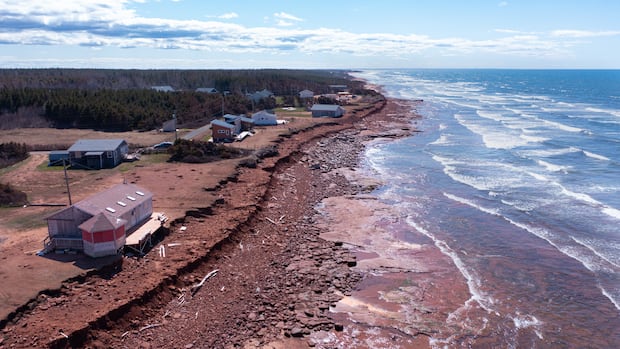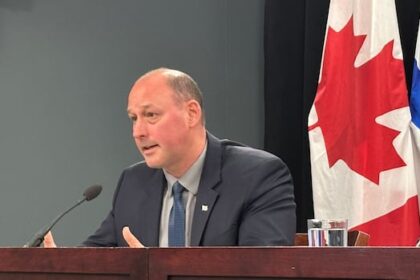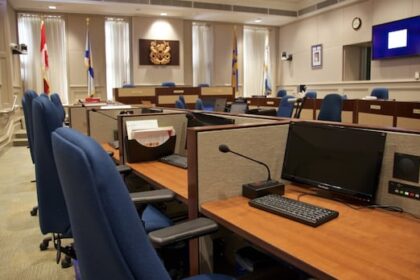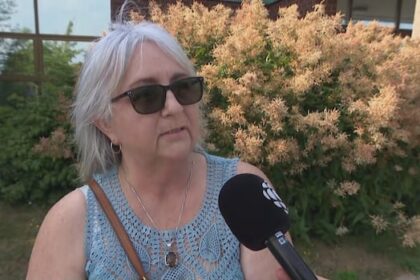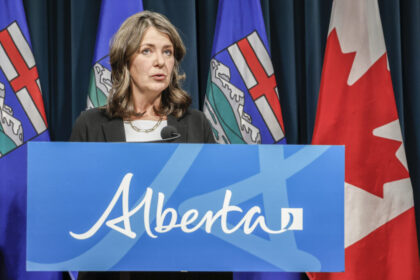PEISome Islanders are raising concerns that federal budget cuts to climate-related programs could have serious consequences for Prince Edward Island. ‘There’s a responsibility there to be stewarding us toward climate action,’ says Island climate organizerBrittany Spencer · CBC News · Posted: Nov 25, 2025 2:18 PM EST | Last Updated: 3 hours agoListen to this articleEstimated 5 minutesThe audio version of this article is generated by text-to-speech, a technology based on artificial intelligence.National climate justice organizer Jill MacIntyre says climate action is particularly important for places like P.E.I., which is ‘very vulnerable to climate change.’ (Shane Hennessey/CBC)Some Islanders are raising concerns that federal budget cuts to climate-related programs could have serious consequences for Prince Edward Island.Prime Minister Mark Carney’s first federal budget outlined how dozens of government departments plan to rein in spending — including the Department of Environment and Climate Change — which will end some small-lease agreements, cut external training contracts, and slash activities and programs that aren’t within its core mandate. Natural Resources Canada is also planning to wind down several programs, including the Canada Greener Homes Grant and the 2 Billion Trees program.“Overall from a climate perspective, the budget was very disappointing to me,” said Jill MacIntyre, a national climate justice organizer based in Charlottetown. She said her disappointment stems from this budget’s heavy investments in natural gas, cutting of the proposed emissions cap, and more investments in fossil fuels and “false climate solutions.” Mark Carney’s first federal budget outlined how dozens of government departments plan to rein in spending – including the Department of Environment and Climate Change – which will end some small-lease agreements, cut external training contracts, and slash activities and programs that aren’t within its core mandate. (The Canadian Press)MacIntyre also pointed to many climate-related programs that were cut or reduced that had a big impact on the day-to-day lives of Canadians, like the Greener Homes program, which provided loans and grants to help people retrofit their homes and make more energy efficient upgrades, like installing heat pumps. “They’re just sunsetting that program even though it’s been quite successful for the entire time it’s been running,” she said. Steve Howard, a former Green Party MLA who owns a renewable energy installation and sales company in Summerside, agreed and said he’s disappointed to see how the federal government’s climate priorities seem to have shifted in this budget.’It’s a major responsibility of our political leaders to really be galvanizing support for climate action,’ says Jill MacIntyre, a national climate justice organizer based in Charlottetown. (Submitted by Jill MacIntyre)“It’s been quite disappointing to see some things that were quite popular be cut out of the budget, and some things that probably work completely against the climate change agenda added to the major prioritized projects,” said Howard. “We seem to be prioritizing large-scale capital projects, very localized projects, rather than some programs that were in place that perhaps more typical Canadians would have taken advantage of across the country.” ‘Galvanizing support for climate action’Howard said cuts to programs like the Greener Homes program mean for a lot of Islanders, making more energy efficient upgrades to their homes will be out of reach. He said the cuts will also have an impact on Island companies — including his own — that provide renewable energy installation services.“If we have Islanders, or Canadians, wanting to make these changes we should be doing everything we can to encourage them to do so.” MacIntyre said that encouragement is particularly important for places like P.E.I., which will be among the first to experience and live with the effects of climate change.“It’s a major responsibility of our political leaders to really be galvanizing support for climate action because it is, you know, for the greater good… we’re on an Island — a low-lying Island — we’re very vulnerable to climate change,” MacIntyre said.“I think there’s a responsibility there to be stewarding us toward climate action.”MacIntyre said she’s even more disappointed to see the federal government actively investing in the fossil fuel industry, like Ottawa’s recent agreement with the Alberta government for a new energy deal, which includes support for a new pipeline. CBC News has learned that Carney and Alberta Premier Danielle Smith have agreed to the broad outlines of a memorandum of understanding that would give Alberta special exemptions from federal environmental laws and offer political support to a new oil pipeline to the B.C. coast. That deal is set to be formally announced on Thursday.’It’s been quite disappointing to see some things that were quite popular be cut out of the budget and some things that probably work completely against the climate change agenda added,’ says Steven Howard, a former Green Party MLA who owns a renewable energy installation and sales company in Summerside. (Zoom)“It’s honestly just so heartbreaking because it feels like, you know, as a climate organizer these are fights we’ve been fighting for decades and it felt like we had some big wins and it felt like, circa 2019, we were having some momentum and people were really on board,” MacIntyre said.“The absolute fact is that a climate-just future is not possible if we’re continually building more pipelines.” But there are some lines in the federal budget that MacIntyre and Howard were happy to see, including the commitment to keep industrial carbon pricing.The budget doubled down on Canada’s industrial carbon pricing system, which is the single largest climate policy in the government’s toolbox in terms of driving down emissions.“Individual carbon pricing was not popular,” MacIntyre said. “It’s good to see the industrial carbon pricing stay in place because it is these higher level, fossil fuel executives that are benefiting the most from the climate crisis, so we want them to actually pay the consequences.” ABOUT THE AUTHORBrittany Spencer is a multi-platform reporter and producer with CBC Prince Edward Island. She’s covered politics, health care and the justice system. She’s a graduate of Toronto Metropolitan University’s journalism program and joined CBC in 2017. You can reach her at brittany.spencer@cbc.caWith files from Island Morning
Federal cuts to climate-related funding are the wrong move, according to these Islanders
